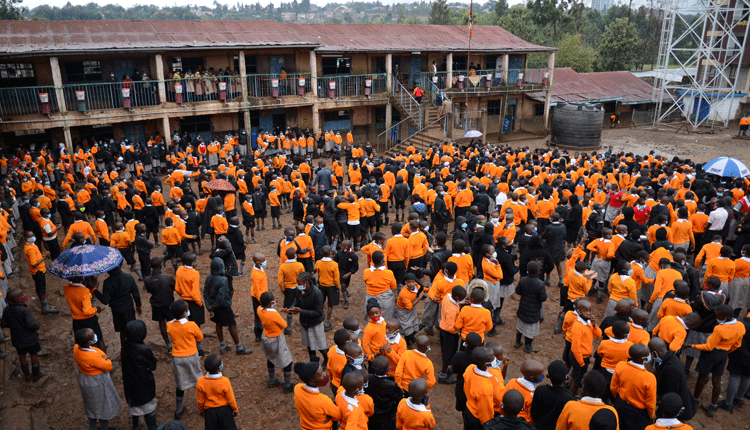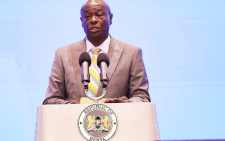The Ministry of Education has announced stringent rules governing the registration of schools.
Revised guidelines stipulate that learning institutions can secure a provisional registration certificate valid for one or five years.
Schools can also be de-registered for a number of reasons, including engaging in exam irregularities, enrolling learners beyond approved quota, change from mixed to single sex or from day to boarding and vice versa.
Education Cabinet Secretary George Magoha said the guidelines will be revised from time to time to reflect the needs of the education sector.
“It is therefore required that all providers of basic education and training adhere to the provisions of these guidelines as far as the registration of basic education and training is concerned,” he said.
The guidelines say the institution will only be allowed to admit learners upon issuance of a certificate of registration.
“The letter of approval of the site is not a licence to admit learners to the institution,” state the guidelines.
Those seeking to set up an institution of basic education and training will be expected to apply to the County Education Board (CEB) upon which they will inform the directorate in charge of quality assurance and standards at that level.
The directorate will assess an application for licensing of the institution to ensure compliance of standards.
Among the factors to be considered before approval are the suitability of the site, adequacy of land, availability of a site place approved by department of Public Works and a valid title deed or lease agreement for leased land and buildings.
Liquor sale
The directorate will also confirm availability of approvals for all infrastructure from the relevant regulatory bodies and confirm institution location is not within a radius of 300 metres from a liquor selling outlet in peri-urban and urban areas.
On tuition infrastructure, an institution must have at least two classes for pre-primary, eight classes for primary, four classes and at least one laboratory for secondary schools under 8-4-4 system.
For CBC, the institution must have two classes for pre-primary school, six classes for primary, three classes for junior secondary and three classes for senior secondary school.
“All special rooms for the pathway chosen must be available. For foreign curricular, classes must be adequate for the full cycle of the level of education to be offered,” the guidelines state.
For new public basic institutions in densely populated areas, the distance between two day primary or secondary schools and two boarding primary or secondary schools must not be less than 600 metres.
The guidelines state that pre-primary institutions attached to primary schools will be constructed not more than two kilometres radius and there will be no boarding pre-primary institutions.
“To establish a new public primary institution in densely populated area, the nearest existing public primary school should have at least two streams with a minimum population of 480 learners.”
For a new public secondary school in densely-populated area, the nearest existing public secondary should have attained three streams with a minimum population of 540 learners.
The institution’s premises or grounds must not have any other use such as residential or commercial.
In the event of re-registration of educational institution, they will be re-assessed afresh if they intend to change from public to private or vice versa.
A registered public institution can only change its status as prescribed by the Basic Education Act 2013 and will be required to advertise in a newspaper with countrywide circulation.
“There will be valuation of Government input in the institution for compensation purposes.
This will enable Government build and equip a new institution. The valuation will include all projects funded by various government agencies like Constituency Development Fund,” say the guidelines.
Approved quota
Parents of the institution, Board of Management, area Chief, Member of the County Assembly, Member of Parliament, Senator and Governor will give their views and approval of such a move.
Similarly, a private institution may be changed to public as long as all the proprietors provide a written agreement made on oath and there is no cost implication to the government and should be free from all forms of liabilities.
“The land on which the institution stands must be transferred to the Government. This process will be irreversible,” states the guidelines.
Some of the factors that could lead to re-registration include enrolment beyond the approved quota, change from mixed to single sex, from day to boarding and vice versa.
This could also happen in the event that an institution had been closed for at least a year, expiry of validity period of five years, transfer to a new site among other reasons.
“Where there is a new delimitation of boundaries by relevant authorities occasioning a change of name of the physical location, the institution will initiate the process of updating their certificate of registration with CEB, this will not require assessment for re-registration,” the guidelines say.
Those applying for registration of educational institutions will pay to Principal Secretary a non-refundable fee to be revised from time to time.
For private educational institutions, they will be required to pay Sh10,000 for one year provisional registration and a similar amount for a five-year registration. Re-registration will cost the same amount.
For public educational institutions, they will be required to pay Sh2,000 for one year provisional registration, five -year registration and re-registration respectively.
Primary and secondary schools risk de-registration if they fail to maintain the required standards set by the Ministry of Education, fraudulent acquisition of registration certificate, involvement in examination irregularities, reported and proven abuse of learners’ rights or employment of unregistered teachers.
For Alternative Provision of Basic Education and Training (APBET), they will be required to offer curriculum approved by Kenya Institute of Curriculum Development (KICD).
They can be established in informal urban settlements within cities like Nairobi, Mombasa and Kisumu and other major towns as designated by law.
“All the teachers in APBET shall have relevant teacher training certificates from recognised teacher training institutions and must be registered by TSC.
They are to provide meaningful participation of teachers, parents and learners in the governance of the institution,” the guidelines direct.
Schools offering international curriculum must have a letter of curriculum approval by KICD, commitment letter to offer Kiswahili and History of Kenya as part of the curriculum and provide a list of recruited teachers of whom 30 per cent should be Kenyan.
International schools must also provide a commitment letter to increase the proportion of Kenyan teachers from 30 per cent to 70 per cent by the fifth year from the date of registration.

















